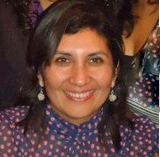CUBA, Dr Sofia
Family doctor: Perú

Dr María Sofía Cuba Fuentes is president of the Scientific Society of Family and Community Medicine in Peru (SOPEMFYC) and a member of WONCA's Organizational Equity committee.
Current Professional activities
I am the medical chief of staff of a clinic (Policlinico JJRL at Essalud Chorrillos ), located in Lima, Peru. I work with 50 other Physicians, over half of them are responsible for primary care. Per annum, we attend to approximately 140,000 patients.
In 2007, we implemented a residency program for family medicine, at Essalud Clinic. This was the first residency program, in a primary health care system, which was developed within the Peruvian health care system. Prior to our program, family medicine residencies where only found in hospitals where there was no supervision by family medicine practitioners.
As well as coordinating the Residency Program, I am also the coordinator of the Masters Program in Family Medicine at the Peruvian University Cayetano Heredia. The Masters Program was started in 2009, with the idea to develop competency in doctors working in primary health care centers – doctors who were not previously trained in Family Medicine. We are also training specialists in Family Medicine who are then able to pursue opportunities within Peru.
Education and Training
I studied medicine at the Catholic university of Santa Maria, in my hometown Arequipa, I did my residency in Family Medicine at the Peruvian University Cayetano Heredia in Lima, and after that I studied a Masters in Social Management at the Pontifical Catholic University of Peru. I also made the Faculty Development Program at Baylor School of Medicine in Houston Texas on 2010, and currently I am in the second year of Masters of Clinical Science of the Department of Family Medicine, at the University of Western Ontario in Canada.
What are your interests at work?
Since I finished my residency, I have been dedicated to teaching Family Medicine. The Peruvian Health Care System needs serious changes and family physicians must help design those changes.
At present, there is a desperate need for family physicians within Lima as well as the rest of the provinces. These physicians must be advocates to liberate Family Medicine from the political grasp and thus make it a more respected discipline, with a solid academic reputation. I believe that good training programs can make this happen.
What is it like to be a Family Doctor in Peru?
In 2011, a group of family physicians started to re-organize the family and community scientific society with the hope to solve problems within the Peruvian health care system.
Although Family Medicine, in Peru, has a history of more than 20 years, a solid health care system based on a primary care is still something which needs to be implemented.
Medical students are not introduced to the discipline of Family Medicine in any of the seven years of medical school. For this reason, they are not aware that Family Medicine is for them to learn about comprehensive and continuous patient care/management through a individualized treatment plan. In Peru, students are not obligated to choose Family Medicine as one of their options of specialization.
On the other hand, there is a lack of family doctors as mentors for the students. Peruvian students as such have no model to follow in primary health care. Our goal is to make changes in the way medical schools offer specialization in Family Medicine - moving student residency from hospitals to primary health care centers.
The number of vacancies offered for residency in Family Medicine has increased in the last 10 years. We moved from two vacancies in all of the country in 2003, to 160 vacancies in 2013. However, despite of this fact, the number of qualified primary care physicians is still insufficient.
When we talk about the attributes of primary health care we think about the first patient contact, the length of the treatment plan, the comprehensiveness to understand the problem and the coordination of resources; however none of these are truly developed in the Peruvian medical schools.
From this point of view, we have a very fragmented health care system, but what we hope to accomplish is to create an awareness amongst family physicians, and with this new understanding and awareness we are hopeful that things within the Peruvian health care system are going to change within the next few years.
Working in the Peruvian health system, as a family physician, is challenging even at the best of times; however we need to focus on how we can improve the life of our patients.
To make contact with Sofia email:
[email protected]